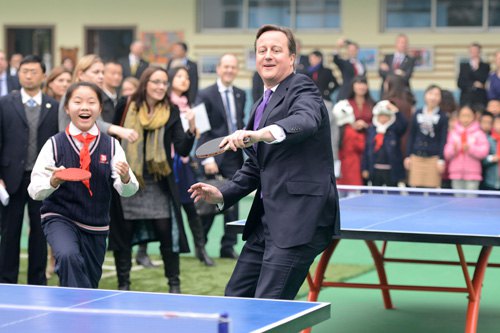|
 |
|
PING-PONG DIPLOMACY: British Prime Minister David Cameron plays table tennis with children at Longjianglu Primary School in Chengdu, capital of southwest China's Sichuan Province, on December 4, during his visit to China (ZHANG LANG) |
He also criticized opponents of trade liberalization with China, saying that Britain wants China to realize its dream and he believes the two countries can help each other succeed in the global race. "An open Britain is the ideal partner for an opening China ... No country in the world is more open to Chinese investment than the United Kingdom," he said.
Kerry Brown, Executive Director of China Studies Center with the University of Sydney, claimed practical cooperation itself could be an efficient way to enhance mutual trust between the two countries.
"Accept that in many areas they (China and Britain) have different values and beliefs, and just focus on practical things like business and other cooperation. They will build trust, not nice words and rhetoric," said the professor to Beijing Review in a written interview.
Seeking opportunities
At a business luncheon with hundreds of Chinese and British business leaders in Shanghai on December 3, Cameron urged British entrepreneurs to hold onto their Chinese opportunities firmly.
Observers believe it is the enormous Chinese market that brought Cameron to head the largest UK trade delegation to China.
Brown told Beijing Review that it is "probably because the United Kingdom knows that investment potential from China is huge, and this follows on from the visit by the chancellor for finance a month ago from Britain to China which underlined how much business can be done with China."
Cameron's visit to China follows those by British Finance Minister George Osborne and the Mayor of London, Boris Johnson, who recently visited Beijing and Hong Kong to drum up investment and try to sell London as the top financial center in facilitating the internationalization of the Chinese yuan.
Cui, of the CIIS, also acknowledged that the vast trade interests and the economic interdependence between the two countries are the major impetus of Cameron's visit.
The British Government is currently seeking a fundamental change in its economic growth, after its banking business—one of the critical support industries—has struggled to deal with the EU debt crisis. As cash flow has declined, economic opportunities have dried up.
As the European continent is still mired in the crisis and U.S. debt is at a record high, China, as the second largest economic power with the largest foreign exchange reserves, has become an important source of capital for London bankers.
Cui said that China has become a political and economic force that cannot be ignored. Britain should take advantage of China's economic rise to seek its own economic expansion.
In the past, Britain used to serve as a capital and technology provider during Sino-UK cooperation, while China was a destination for UK investment. But this time, Cameron and his delegation tried to attract more Chinese investment to the UK.
Statistics show that investment from the Chinese mainland in Britain has been increasing rapidly and the UK is now one of the most popular destinations for the Chinese mainland's outbound investment after Hong Kong and the United States. The overall stock of Chinese investments in Britain is about $9 billion while Britain has roughly double that amount of investments in China. Bilateral trade is also on the rise. The latest data from Chinese Customs show that Britain became China's second largest trade partner in the EU in the first 10 months of 2013.
Upon his arrival in China, the British prime minister witnessed a signing ceremony of British vehicle makers Jaguar Land Rover for a deal worth £4.5 billion ($7.38 billion) to provide 100,000 cars to the National Sales Co. in China, which means providing indirectly 38,000 jobs in Britain.
| 